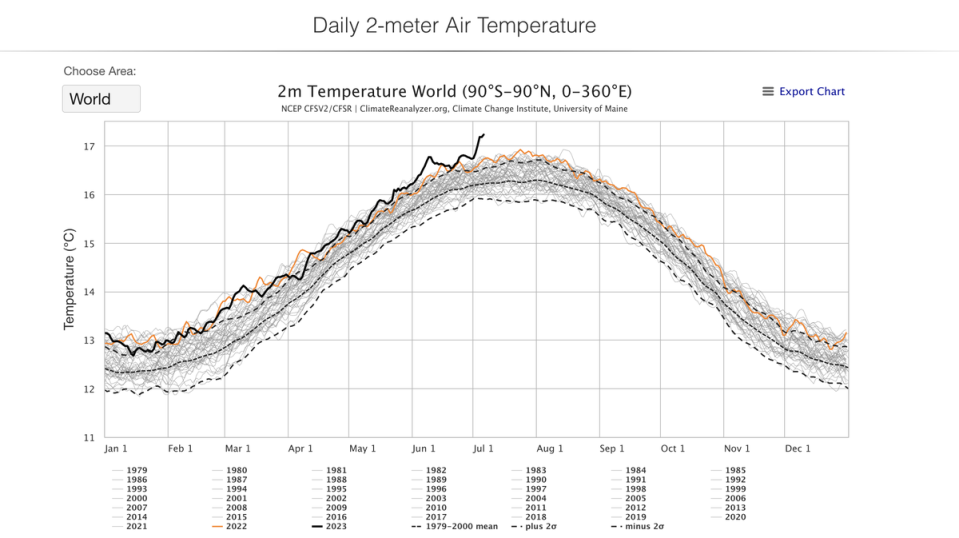Earth sets its hottest day record for third time in a week
For the third time this week, the planet’s average temperature broke all previous records.
On Thursday, 6 July, Earth was an average 63 degrees Fahrenheit (17.23 degrees Celsius), according to an unofficial measurement by Climate Reanalyzer, a platform that uses climate and weather forecast models to take the global temperature.
This surpassed the record of 62.9F (17.18C) set on Tuesday and maintained Wednesday, which in itself topped Monday’s record-breaking 62.6F (17.01C).
The figures still must be confirmed by official international and national government bodies but nevertheless have set off alarm bells in the scientific community as the climate crisis causes a pile-up of more and more dangerous extremes.
“Such records are the predictable consequence of a short-term El Niño temperature boost coming on top of the long-term global warming trend due to mankind’s greenhouse gas emissions,” tweeted Dr Robert Rohde, the lead scientist at the climate nonprofit, Berkeley Earth.
“Global warming is leading us into an unfamiliar world.”
Wherever you look around the world, there is a litany of new extremes. The African continent experienced its hottest night ever recorded, according to US Stormwatch, which tracks extreme weather globally.
The nighttime low in Adrar, Algeria was 103.3F (39.6C) on Thursday.
Cities across China opened air raid shelters on Friday to offer residents relief from severe heat as deaths were reported in Beijing and Shaoxing. Earlier this week, the Chinese capital reported more than nine straight days with record-high temperatures exceeding 95F (35C), according to the National Climate Center, compounded by drought.
Africa just saw its hottest night ever recorded.
Adrar, Algeria's nighttime low was a searing 39.6°C (103.3°F) 🔥 pic.twitter.com/ZQxgmkH3UY— Colin McCarthy (@US_Stormwatch) July 7, 2023
In the UK, the Met Office issued a heat health alert for six regions as temperatures are set to soar to 30C this weekend.
The warnings were directed to six regions – London, Yorkshire, east and west Midlands, and the east and southeast of England – from midday on Friday until 9am on Sunday.
Germany warned the elderly, people with health conditions, pregnant women and parents with young children to seek out cool places amid forecasts for 95-99F (35-37C) this weekend combined with high humidity.
Germany‘s Health Ministry urged people to stay indoors, consume enough liquids and avoid strenuous activity, particularly during the day.

In the Antarctic, temperatures soared to unprecedented levels, reaching as high as 8F (4.5C) above normal in the polar region.
Dr Friederike Otto, a climate science lecturer at the Grantham Institute for Climate Change and founder of World Weather Attribution (WWA) which assesses the role of global heating in extreme weather, called the new heat records “a death sentence”.
“This is not a milestone we should be celebrating, it’s a death sentence for people and ecosystems,” she said this week. “And worryingly, it won’t be the hottest day for a long time.

“With El Niño developing, the world will likely break this record again in the coming months. We absolutely need to stop burning fossil fuels.”
The scorching heat is being driven by emissions caused by burning fossil fuels, as well as El Nino - a cyclic climate pattern which means severe temperatures in many places.
The new record average is more than 1C higher than on the same day 30 years ago, when global temperatures had already been influenced by the human-caused climate crisis.
Along with intense and earlier heatwaves, the high temperatures are contributing to larger wildfires, erratic rainfall and stronger cyclones. Extreme weather is hitting the world’s poorest communities the hardest - despite their negligible contributions to global emissions.


